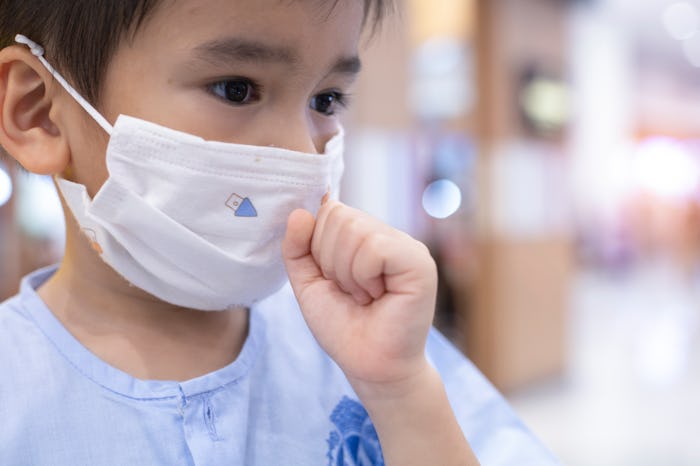Life

Everything You Need To Know About Your Kids & Coronavirus
With reports of the worldwide spread of coronavirus dominating news headlines, the possibility of infection is likely on the minds of many individuals — especially parents. Parents not only worry about themselves during a potential health crisis, but are concerned if children can get coronavirus, too.
The short answer is yes — they can. "All humans are susceptible to coronavirus, including the COVID-19 subtype," pediatrician Dr. Natasha Burgert, MD, FAAP tells Romper. However, there is more to consider during this outbreak than just whether or not a child can contract the virus.
Although the novel coronavirus (also referred to as COVID-19) originated in Wuhan, China back in January, the Centers for Disease Control and Prevention (CDC) reported confirmed cases on every continent except Antartica as of March 3. An increase in infected individuals and the rapid spread of the virus has caused an understandable amount of panic, but parents may be especially worried about their child's risk of exposure and infection.
The American Academy of Pediatrics (AAP) released a statement on Feb. 28 to address the COVID-19 outbreak as it relates to children. The statement included a quote from Ann-Christine Nyquist, M.D., FAAP, a member of the AAP Committee on Infectious Diseases that reads, "Based on what we know, children have experienced a mild form of the disease and some have been hospitalized."
While children can contract COVID-19, Dr. Niket Sonpal, a New York Based Internist and Gastroenterologist and Adjunct Professor at Touro College tells Romper that the CDC has been upfront about the fact that most reported cases have been in adults.
"At this time, there is no evidence to support an increased susceptibility in children," Dr. Burgert says. She does caution that the data on susceptibility is "preliminary at best" as "the vast majority of the people being tested for COVID-19 are critically ill" and many children showing mild symptoms have not fallen critically ill, so they are not being tested.
"We do know that this is a highly transmissible virus, and what this tells us is that children are at risk because of the environments of a school where many people congregate," Dr. Sonpal says. He also notes that because children are not always apt to following preventative measures with regard to the spread of germs, they may be more at risk when it comes to spreading the virus.
"Reports of children with COVID-19 are limited, but what information is available describes cold-like symptoms, which can include fever, runny nose, and coughing," Dr. Sonpal says. He tells Romper that the limited reports also include vomiting and diarrhea in one pediatric case, and "severe complications like respiratory distress or septic shock" have also been reported.
As with any transmittable virus, experts recommend following routine precautions to help keep your family healthy, just as you would during any other cold and flu season. Dr. Jennifer Trachtenberg, a pediatrician and SpokesDoctor for the AAP says that frequent hand washing with soap and water for at least 20 seconds (or a hand sanitizer with at least 60% alcohol when soap and water are unavailable), covering your mouth when you cough or sneeze, and staying up to date on all vaccines is crucial.
"Keep sick children home from school and activities when sick so as not to infect others," Dr. Jen says. Additional tips include "having kids take off shoes and change clothes when coming home" and "disinfecting used items and common areas in the home when someone is sick."
If your kids are concerned about the coronavirus, it is imperative to communicate with them about the outbreak on their level, experts say. "Remember that can kids get stressed out about this news, too," Dr. Burgert tells Romper. Reassuring your kids and arming them with age-appropriate facts can help.
Despite an announcement by U.S. Department of Health and Human Services (HHS) that vaccine development is underway, to date no vaccine for COVID-19 exists. As the situation evolves and more cases are confirmed in the United States, some schools put emergency plans in place for potential outbreaks in their communities. Parents should stay informed on what symptoms to look for in children, as well as what can be done to protect against the spread of illness.
"Understand your work/school/daycare communication plan in case of disruption or closures in your community," Dr. Burgert advises. "Lean into your local public health authorities, the CDC, and the World Health Organization (WHO) who are on the front lines of protecting our communities."
If you think you’re showing symptoms of coronavirus, which include fever, shortness of breath, and cough, call your doctor before going to get tested. If you’re anxious about the virus’s spread in your community, visit the CDC for up-to-date information and resources, or seek out mental health support. You can find all of Romper’s parents + coronavirus coverage here, and Bustle’s constantly updated, general “what to know about coronavirus” here.
Experts:
Dr. Natasha Burgert, MD, FAAP, pediatrician in Overland Park, KS who writes at KCKidsDoc.com
Dr. Niket Sonpal, New York Based Internist and Gastroenterologist and Adjunct Professor at Touro College
Dr. Jennifer Trachtenberg, pediatrician and assistant clinical professor of pediatrics at The Icahn School of Medicine at Mount Sinai
This article was originally published on